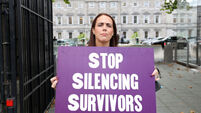'Under-resourced' rape crisis centres struggle amid a surge in demand during the pandemic

Rape crisis centres are 'overstretched' due to a surge in demand and 'a struggle to hire specialist counsellors because of the lack of a dedicated budget for training'. Stock picture
Rape crisis centres around the country are reporting increasing levels of demand for their services amid fears they are "operating far beyond capacity and resources".
The annual statistics issued by the Rape Crisis Network Ireland (RCNI) also showed that just 38% of incidents were reported to a formal authority, including gardaí — meaning 62% were not, a figure consistent across all age groups.













